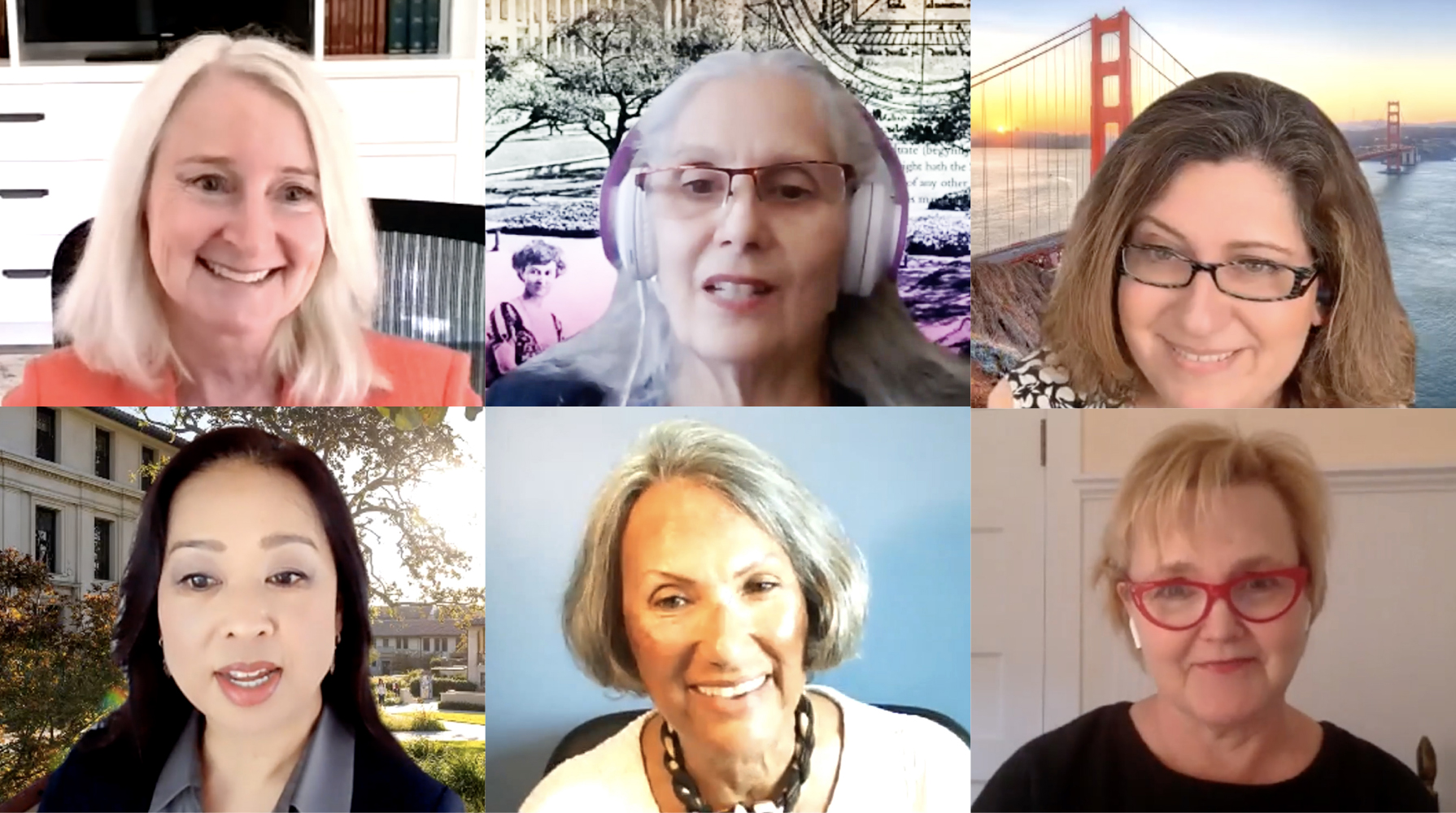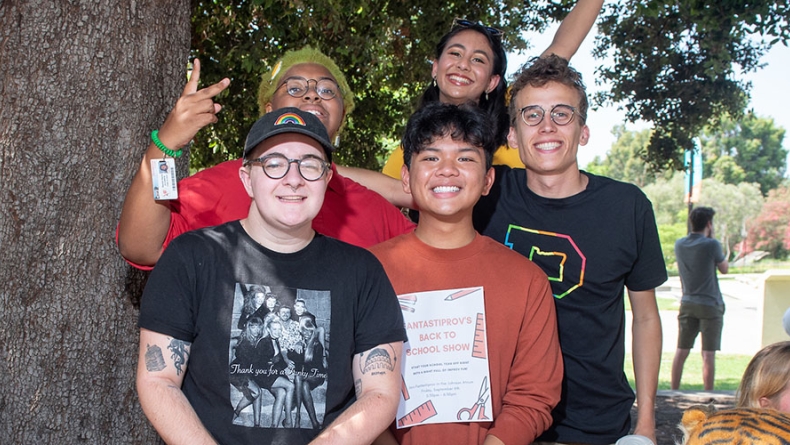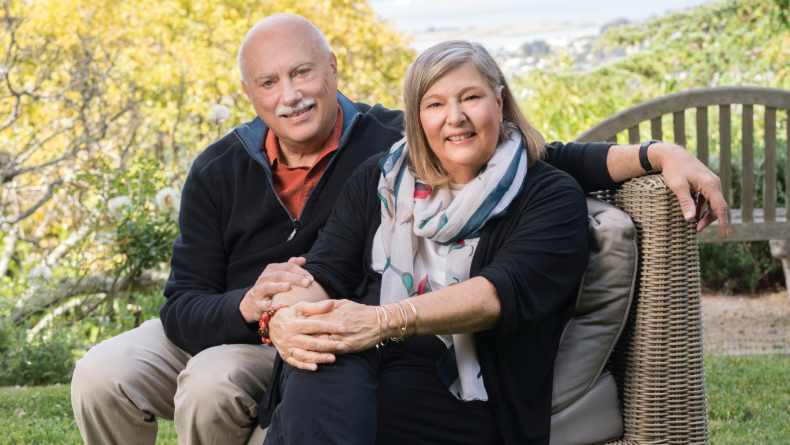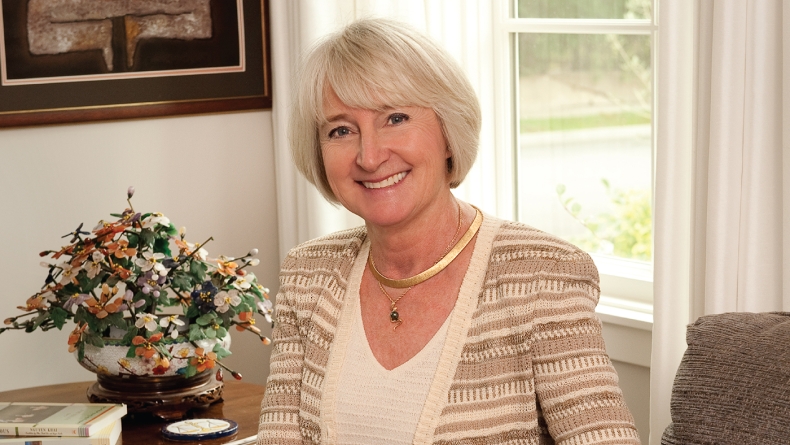
An Oxy volunteer leadership panel examines the impact and influence of women in philanthropy
Long considered as the backbone of civic engagement, women's philanthropy continues to evolve in creative and trailblazing ways—and a November 12 webinar examined the long, rich history of women's philanthropic contributions to Occidental.
"As women have gained more financial success and opportunities in our society, there's been a rise in the role of women in philanthropy," said Oxy trustee Gloria Duffy '75, president and CEO of the Commonwealth Club and host of Oxy Women in Philanthropy: Values, Vision, and Voice. "Many of Oxy’s most generous contributors are women, and this is a good chance for us to learn and share experiences with one another."
According to the Women’s Philanthropy Institute (WPI) at the Lilly Family School of Philanthropy, Indiana University–Purdue University Indianapolis, women currently hold about 40 percent of global wealth. In decades to come, that number will only grow: The Boston Global Group estimates that by 2025, women will have accumulated assets worth $110 trillion—and women are expected to inherit 70 percent of the wealth that will be passed down over the next two generations, according to WPI director Jeannie Sager, who moderated the conversation.
Duffy kicked off the conversation by talking about her own philanthropic history with the College, followed by a short presentation by Sager about the WPI's research. Sager then moderated a conversation that included experiences and reflections from five female philanthropic leaders in the Oxy community:
- Trustee Anne Wilson Cannon '74, independent financial adviser, CPA, and co-chair of The Oxy Campaign For Good;
- Barbara Clarke P'19, investor, economist, and entrepreneur and mother of Isabella Clarke Capeci '19, a cognitive science major from Boston;
- Trustee emerita Alice Walker Duff '69 H'02, retired managing director of Bread for the World Institute and co-convener of Oxy's Black Alumni Organization;
- Judy Lam '87, partner with Maynard Cooper & Gale and leadership volunteer with Oxy's Asian Pacific Islander group; and
- Silva Zeneian '01, managing director of Fiducia CP and vice chair for leadership giving for the Oxy Fund.
The full 90-minute conversation can be viewed online. (The remarks below have been condensed and edited for clarity.)
Gloria Duffy: I first served on the Alumni Board of Governors when I had come back to California after grad school, but when I returned to the East Coast, the connection was broken for a while. In the early 2000s, an alum asked me to dinner with then-Oxy President Ted Mitchell at someone's home here in Atherton. I was very inspired by him and I was about to leave the board of the Compton Foundation [a family foundation in San Francisco], and the tradition was that the departing board members were able to direct a grant to a project that they wanted to do. So, I was able to direct a $100,000 grant to a student conference on global issues at Oxy. I've been engaged at Oxy ever since.
Jeannie Sager: What was the first or most meaningful time you realized the power of giving and potential of your own voice for a cause or an issue?
Alice Walker Duff: My freshman year began right after the Watts riots—and before my senior year, both Martin Luther King and Robert Kennedy were assassinated. The few Black students that were at Oxy created the Black Student Caucus and cemented bonds of friendship and support that continue today. We debated all sorts of issues—Vietnam, civil rights, Black power, Black liberation, misogyny—and what we could or should do about it. The discussions always came down to this question: What power do we really have?
As it turns out, we had considerable power. We assessed the issues we thought Oxy needed to address to be part of the solution rather than part of the problem, and what we and what other students of color needed to succeed at Oxy. We developed a list of demands—very ‘60s-ish—and we took those demands to the Faculty Senate to make a change for change in the curriculum. We were told by the chair of the English department that there was not enough content for a Black literature course. We knew that wasn't true, and we continued to press. By my senior year, I was able to take Oxy’s first course in African-American literature—and I knew that, when organized and done in conjunction with others, I had a really powerful voice.
Fast-forward 50 years: I retired after a very impactful career. Working for four years for the Atlantic Philanthropies, I was able to develop my own personal principles for giving and was able to donate way more to Oxy than I ever expected. Along with most of those founders of the Black Student Caucus, my husband and I endowed the African-American and Underrepresented Student Success Fund. I have high expectations for that fund and I think it will demonstrate the power of collective giving.
Judy Lam: I grew up in an immigrant household, and there was a bit of a scarcity mentality in the way I was raised. I did not feel that I had a wealth of resources and there was a focus that money was the way to make an impact. If you don't have much of it, then you don't think very much of your ability to affect change. I thought that philanthropy was really for very rich people.
As a young lawyer, I began to learn that giving is not just in dollars alone. I was in a ballroom of over 1,000 young lawyers—most of them Asian—and we were listening to a senator from Illinois named Barack Obama. And he said to this group, "Look at how powerful and how accomplished this whole room is."
Then he gave us a call to action that was so powerful. He said that we are not all at the table—that we need to step up and to stretch and to exert our voice, not just to build a career and make money and buy things, but to get involved and show leadership. He inspired the whole room to examine what success means to think and to give beyond your careers.
It was when I began to volunteer at Oxy that I understood more clearly that the cost of tuition does not cover the full Oxy experience. Even though my parents paid for me to attend—and I felt like it was a big price tag and came at great sacrifice—many others gave before me, and that was the only way that I was able to really be there and to live the full Oxy experience. The power of that giving really struck me in these two moments.
Sager: Anne, there are endless good causes and issues to support. What is your decision-making process for your own philanthropic investments and how did you choose these for yourself?
Anne Wilson Cannon: Don't we all wish that we could support every cause that interests us? It's impossible to do so, but I am mindful that every nonprofit organization depends on annual giving. Every gift that comes in unrestricted goes right to the bottom line in supporting whatever mission that nonprofit has. I have a number of organizations I give to—things like the Humane Society, California Parks, and Planned Parenthood—but I focus on Oxy for a couple of reasons.
The first motivation is gratitude. I wouldn't be here today, living the life that I live, had it not been for Oxy. The second motivation is I want to make an impact on other people's lives. And I truly believe that education is the best means for people to improve their lives. So, I give as generously as I can to the Oxy Fund and I've also made a sizable bequest for whenever I pass on—which may be quite a while from now given my father's age of 96. So, Oxy hopefully we'll have to wait for that money to come in.
Sager: I want to talk about the gift of talent. Barbara, you serve on board of directors and advisory boards for several private and public companies and associations. Why do you feel it's important to ensure that women have voices at these very important tables? Are you seeing an increase in participation from women and women of underrepresented groups at these tables today?
Barbara Clarke: Yeah. It's funny how sometimes we have this conversation where we want to have our seat at the table. I run a company called The Impact Seat, so I’m always thinking about having a seat at the table or making seats at the table for people. The data has shown over and over that women on boards make those companies perform better. It's not even a question.
If you have lived on this Earth for a certain amount of time and gotten to where you are, wherever that is, you have something valuable to contribute. I encourage people to do boards. It's like using your super power for good by serving on a board you're representing a lot of people when you open your mouth on a board.
I believe there's a lot of cross-pollination between nonprofit boards and company boards. I chaired the board of a network of independent schools and I use some of that discipline from that experience for some of the small startup companies that I serve on the board of so it's definitely applicable and a really rewarding experience.
Sager: Alice, women often have full and complicated lives, balancing paid work, family, and children; caring for elderly parents or others; and so on. There are also endless valuable charities and causes as such. What would be your guidance to women looking at how to balance the need with your own available resources and avoid burnout?
Duff: Burnout is fairly easy to avoid when you make sure that what you spend your time on matters. Balance is a very different thing, and very difficult to achieve in life and giving—but it's easier to achieve and maintain If you remember three things.
First, you have to get comfortable with saying no to something so that you can do other things better and get a bigger impact. Even Chuck Feeney’s $8 billion, which he used to create the Atlantic Philanthropies and accomplish many important and wonderful things, was just a drop in the bucket of total need. You have to learn how to say no, which is hard for many women because we're so socialized to say yes.
Second, you have to have a strategy and a plan to decide how to direct your giving and spend your time. My strategy is to collaborate with others through organizations. The key to remember is that you have time and there are many paths to the same destination.
My third and most important comment is: Always keep "the main thing" the main thing. How do you know what your main thing is? Just outline your obituary. Include the realms in life that matter to you. Typically, they’re family, community, career, and the power that you consider your Creator. Within each one of those realms, write down what you want people to say about you in those categories. I almost guarantee you that if you go through that process, it will be really clear to you what your main thing is.
Sager: Aligning yourself publicly with an issue or cause is a very personal choice as well as an enormous responsibility. There are endless good causes and issues worthy of support. Anne, what is your decision-making process for identifying those causes you choose to support in this way?
Cannon: First of all, if you cannot publicly talk about or advocate for the causes you support, you should really rethink what organizations you are supporting and examine your values in your heart and mind. I am proud to advocate for Oxy. I'm a total believer and one of Oxy’s biggest fans.
Sager: Silva, at a time when some alumni and students may be looking to make shifts in their careers, how can volunteering aid in this?
Silva Zeneian: I can't think of a better avenue for building the depth and quality of your network than volunteering. Giving your time and engaging with causes and organizations that are important to you allows you access to people that you would probably never meet in a purely social context—and it allows them to see you work outside of a strict formal work environment.
I personally found my career through philanthropy. I met my first boss because we both volunteered for a children's camp and I would have never considered this as a career path. Had I not met him through that camp, I would have never ended up in commercial real estate.
There was a guy named Carl Terzian who ran a public relations firm in Southern California as well as a networking group. When he would invite people to introduce themselves, he would say, “There's the front of your business card which tells people what you do. The back of the card—the empty side—is the organizations you belong to. It's the causes that speak to you.”
So, he would ask us to give people our cards but speak to the back of the card. It's how the people that he would bring together at these events would meet and connect with each other. Philanthropy and volunteering allow you to connect with people on the back of your card. Carl is no longer with us, but I always think of him and the back of the card and how volunteering allows you to expand that.
Sager: Why do you give to Oxy?
Duff: My time at Oxy really was formative for me. Not only was it intellectually formative, but I made friends that I've had forever. Oxy is still a wonderful place that needs to do a lot to live up to its mission: providing an education to a diverse group of students while upholding its cornerstones of equity, excellence, and community service. I figure that I benefited from that and I really want Oxy to achieve that.
Lam: Much like what Alice said, Oxy was transformative in my college years but also even long afterward. For me and many others, it’s been a place for lifelong learning, for ongoing personal and professional growth. The ability to think critically and have a dialogue about important issues is priceless and we need more of that.
Giving to Oxy just pays it forward—that promise stays alive and healthy. It's very tangible and rewarding to see a bright young student at Oxy who’s being prepared for a big world and bright future. Scholarships such as the API Scholarship and the Class of '87 Memorial Scholarship [both of which Lam was instrumental in creating] provide access so that students who are very talented but who might not otherwise be able to afford it could have the Oxy experience and spread that “Oxyness” in the world.
Cannon: After three years at Oxy, I transferred to the Wharton School and I became a CPA. But I appreciated the Oxy education that I had for those three years and I always wanted to graduate with a major in anthropology. So, I returned to Oxy in 2005 and completed the requirements for my Bachelor of Arts degree and I graduated with the Class of 2006.
I don't think that I would have such an affinity for Oxy if I had not returned and joined the students at that time. My son was exactly the same age as the seniors. We both graduated on the same day. It was a wonderful experience for me to be a student again and I appreciated Oxy all the more.
Clarke: My daughter had a great experience at Oxy. I believe in the transformative power of a great education, and we've been very deliberate in our conversations as a parent and child about how we can make sure that others have the benefit of this great education and identifying very strategic meaningful ways to give back. It's been great to do this in collaboration with her so that she starts to develop a sense that philanthropy isn't just for other people—you have to start at some point to think about this yourself.
Zeneian: Oxy was transformative for my life and that experience was made possible because of somebody else's philanthropy. Supporting Oxy financially as well as with my time is the most direct way for me to pay that forward.
Clockwise from upper left: Cannon, Duffy, Zeneian, Clarke, Duff, and Lam.



